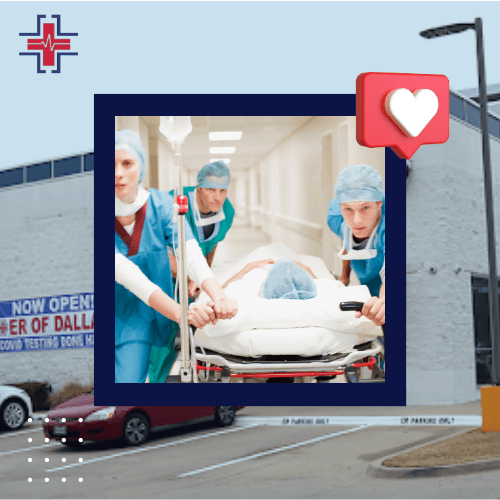Top 5 Reasons to Choose an Emergency Room with MRI Near Me

Introduction
When a medical emergency arises, finding the right facility is crucial. Whether it's a head injury, severe back pain, or an internal issue requiring detailed imaging, an emergency room with MRI near me can be a lifesaver. Magnetic Resonance Imaging (MRI) provides high-resolution images of soft tissues, allowing doctors to diagnose and treat conditions accurately. If you're in need of an ER that offers MRI services, this article will guide you on what to expect and where to find the best facilities.
Why an Emergency Room with MRI is Essential
1. Faster Diagnosis for Critical Conditions
MRI scans are vital for detecting strokes, brain injuries, spinal issues, and internal bleeding. Having access to an MRI-equipped emergency room ensures that patients receive immediate and accurate diagnoses, leading to quicker treatment.
2. Advanced Imaging for Trauma Cases
In cases of severe accidents, an MRI scan can reveal injuries that X-rays or CT scans might miss. Soft tissue damage, ligament tears, and nerve issues are best detected through MRI, making it a necessary tool in emergency care.
3. Reduced Need for Transfers
Many hospitals without MRI facilities must transfer patients to other locations for scanning, causing delays in treatment. Choosing an ER with MRI on-site minimizes wait times and improves patient outcomes.
4. Expert Radiologists Available 24/7
Emergency rooms offering MRI services often have specialized radiologists on staff to interpret scans immediately. This ensures rapid and accurate results, reducing the risk of misdiagnosis.
5. Comprehensive Care Under One Roof
An ER with MRI capabilities often provides additional emergency services, such as CT scans, ultrasound, and lab tests, ensuring that all medical needs are met in one location.
How to Find the Best Emergency Room with MRI Near Me
1. Check Online Reviews and Ratings
Websites like Google Reviews and Healthgrades offer valuable insights from patients who have visited various emergency rooms. Look for highly-rated facilities with positive feedback on MRI services and overall patient care.
2. Verify MRI Availability
Not all emergency rooms have MRI scanners on-site. Before visiting, call ahead or check their website to confirm MRI availability, especially if you suspect a condition requiring advanced imaging.
3. Look for 24/7 Availability
Medical emergencies can happen at any time. Choose an ER that operates around the clock and has MRI services available 24/7 to ensure you receive timely care.
4. Consider Location and Accessibility
Proximity is crucial in an emergency. Search for an ER near your home or workplace, and check if they offer easy access via ambulance or walk-in services.
5. Ensure Insurance Coverage
Before visiting an ER, verify that they accept your insurance plan to avoid unexpected costs. Most hospitals have a billing department you can contact for insurance-related inquiries.
What to Expect During an MRI Scan in an ER
-
Preparation: Depending on the type of scan, you may be asked to remove metal objects and change into a hospital gown.
-
Positioning: The MRI technician will position you on a table that slides into the MRI machine.
-
Scan Process: The scan can take between 15-60 minutes, during which you must remain still. You may hear loud noises from the machine, but earplugs or headphones are often provided.
-
Results: A radiologist will analyze the images and share findings with your doctor, who will then determine the next steps for your treatment.
FAQs
1. How long does an emergency MRI take?
The scan itself can take anywhere from 15 to 60 minutes, depending on the type of imaging required. However, emergency cases are prioritized for faster results.
2. Will my insurance cover an emergency MRI?
Most insurance plans cover emergency MRIs, but coverage depends on your policy. It's best to check with your provider or the ER billing department.
3. Are there risks associated with MRI scans?
MRI scans are generally safe, but they are not recommended for patients with metal implants, pacemakers, or claustrophobia. Always inform your doctor of any concerns before the scan.
4. Can I eat before an emergency MRI?
In most cases, you can eat and drink as usual unless your doctor advises otherwise for specific scans, such as abdominal MRIs.
5. How do I know if an ER near me has MRI services?
Call the facility directly or check their website to confirm if they offer MRI imaging as part of their emergency services.
Conclusion
Finding an emergency room with MRI near me is essential for quick and accurate diagnoses during medical emergencies. By choosing a facility with MRI capabilities, you ensure timely treatment, reduced risks, and better overall care. ER of Dallas provides top-notch emergency services, including MRI imaging, to give patients the best medical attention when they need it most.
- Questions and Answers
- Opinion
- Motivational and Inspiring Story
- Technology
- Live and Let live
- Focus
- Geopolitics
- Military-Arms/Equipment
- Güvenlik
- Economy
- Beasts of Nations
- Machine Tools-The “Mother Industry”
- Art
- Causes
- Crafts
- Dance
- Drinks
- Film/Movie
- Fitness
- Food
- Oyunlar
- Gardening
- Health
- Home
- Literature
- Music
- Networking
- Other
- Party
- Religion
- Shopping
- Sports
- Theater
- Health and Wellness
- News
- Culture

